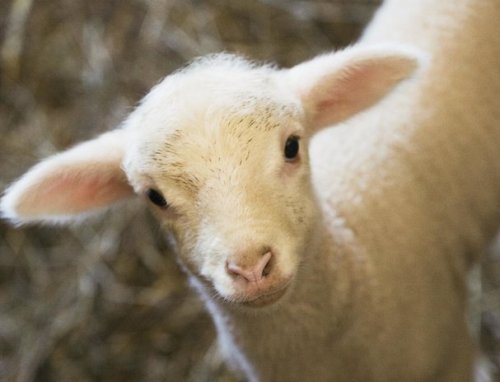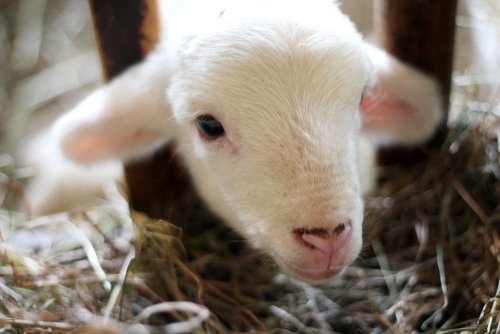Dying for Dinner : Millions of Lambs Slaughtered for Easter
Agnus Dei,
qui tollis peccata mundi,
miserere nobis.
Agnus Dei
Dona nobis pacem.
Those of us who studied Latin knew the translation.
Lamb of God,
Who takest away the sins of the world,
have mercy upon us.
Lamb of God.
Grant us peace.
But there was a total disconnect between the metaphor of Christ as the Lamb of God whose death redeemed the world and the fate of billions of real lambs who had no part in humanity’s sin, who had no choice in their own slaughter, and whose unwilling suffering and sacrifice came to nothing but dinner for meat-loving human beings on Easter Day.
Like you, I also searched The Bible for passages that would condemn animal abuse. There were sparse references that most churches ignored.
The Bible was written in a different, harsher time. There was little mercy for people or animals and no understanding of modern medicine or science. The language was that of myth, not historical fact. The writers of The Bible sought to explain the world and how it came to be, why there was suffering and injustice, why people performed the rituals and held the beliefs that guided their lives, and how to placate an angry deity with sacrifices.
And while The Bible does not show much concern for or kindness to animals, many of the greatest evils never occurred when The Bible was written : There were no factory farms or transport trucks or massive slaughterhouses. No research labs or fur farms. No grinders to get rid of useless male chicks. No rodeos. No crush videos.
There is no excuse for ignoring or justifying those evils now. Knowledge has proliferated in every field, especially in the sciences. We now know that animals are sentient, intelligent beings who are capable of most of the emotions people themselves feel. We also know they are innocent and powerless to fight back against the abuses they suffer. Yet many people still excuse even the worst animal cruelty and exploitation under biblical dominionism—in the 21st century !
I’ve come to believe that the main problem lies both in human nature and in the churches who understand that nature only too well, to the point they have abandoned morality to pander to it.
It comes down to this : Church leaders know they will be fighting a losing battle if they speak out against animal cruelty. If they condemn eating meat, hunting, fishing, animal-centered entertainment, then every exploitative and abusive industry and institution who has something to lose would engage in battle, from Big Ag to the NRA. And all those groups, who fulfill the demands for human pleasure and profit derived from animal suffering, would win.
Congregations would abandon their churches and the collection plates would remain empty.
Church leaders are pragmatic enough adhere to speciesism, to make that the dividing line. After all, for centuries the churches have loudly spoken out against sins and crimes against human beings : They condemned the murder, violence, robbery, thievery, lying, and adultery forbidden by the Ten Commandments. And the result ? Long lines at the confessional and overflowing prisons ?

So I cannot imagine the time when Religion will truly help nonhuman animals. A baby step here is always followed by a retraction there when it comes to real change and the demand for people to make sacrifices. Even in the countries whose religions claim a belief in ahimsa, there is no shortage of animal suffering.
As Pogo’s simple wisdom reminds us, we are the enemy. The potential for evil lies in human nature itself, in its proclivities for violence, greed, selfishness. The churches know it and have sacrificed nonhuman animals, eliminating them from the circle of moral concern, rather than fight a losing battle against their abuse.
So Easter is approaching, and in his season of rebirth and hope the transport trucks will carry millions of innocent lambs, newly arrived on this earth, to their death.
